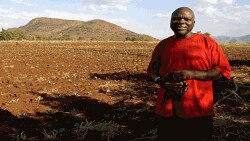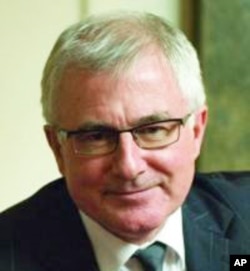Boosting agriculture, while reducing greenhouse gas emissions. That’s the goal of the new Global Research Alliance, which was unveiled Friday in Rome.
The idea was spearheaded by New Zealand after the 2009 U.N. Climate Change Conference in Copenhagen. Among those supporting the alliance are the United States, Britain, China and South Africa.
“We’re bringing together two big ideas here. The world’s got to produce a whole truckload of more food in the next 30 years to feed three billion more people that are going to be on the planet…. And we’ve got to try and reduce the emissions intensity of that,” said Tim Groser, New Zealand’s minister of trade, who’s also responsible for the country’s climate change negotiations.
Polluting crops?
“A whole lot of emissions come out of growing food. In the world, there are about as much emissions come out of growing food as come out of every truck on the planet, every car, every plane, every boat, every train. So, we’ve got to try to reduce that because food is not an option. And we think we can do this, but we’ve got to bring to bear some of the world’s finest scientific minds,” he said.
The alliance is a network, he said, that’s bring launched politically at the Rome ceremony. It will aim to expand current know-how, while developing new methods and technologies to reduce greenhouse gas emissions from agriculture.
“The brains do exist around the planet. The know-how does exist in some areas, but we need some breakthrough technologies,” said the New Zealand trade minister.
Looking for an answer
“I know in my own country, where we’re sort of specialists in livestock, that we’ve seen a huge variance in the amount of emissions going into the atmosphere from our livestock. Same cattle, same sheep, whatever, same feeds, same management. We know somewhere the answer lies in the microbiology inside the animal, the rumen, and we’ve got to try to decode that with modern science,” he said.
Groser believes there could be scientific breakthroughs within 10 years.
New Zealand took the lead in forming the alliance, but others have been quick to lend support. He said developed countries cannot be the only ones dealing with climate change.
“That cannot be the way forward,” he said. “Let me make that very clear…. Out of all the developed countries in the world, New Zealand had this unique issue in that half of our emissions come from agriculture. That’s really more typical of developing countries than developed countries. So, out of our own problem we scratched our heads and thought, look, we can’t do this alone. This is actually not just a New Zealand problem. This is a global problem.”
The Global Research Alliance has initial support from 36 countries.
“I am just amazed at how quickly this international initiative has come together,” he said. He praises U.S. agriculture secretary Tom Vilsack for his strong backing of the alliance and said the support of China and Brazil is “hugely important.”
Paying for the research
Funding is voluntary. For example, the U.S. is contributing $90 million dollars with New Zealand and Canada about $40 million.
“It’s not really an international organization. Think of it more as a 21st Century network. People put the money on the table,” he said.
The alliance has not set a deadline for solving climate change concerns.
“I think if you try and look at the response of the world to the challenge of climate change, it’s a big mistake to just look at the formal U.N. negotiating process and the chaos of Copenhagen and so on and so forth,” he said.
The conference was criticized by some for failing to reach a substantial agreement on climate change. As a result, the Global Research Alliance will include not only governments, but also private corporations from around the world. Groser said they are trying to reduce their “carbon footprint.”
“It’s not part of a coordinated exercise. It’s more inspired by the single idea that over the next 30 to 40 years we’ve got to try to lower the growth rate of emissions going into the atmosphere. That’s the unifying idea,” said Groser.





